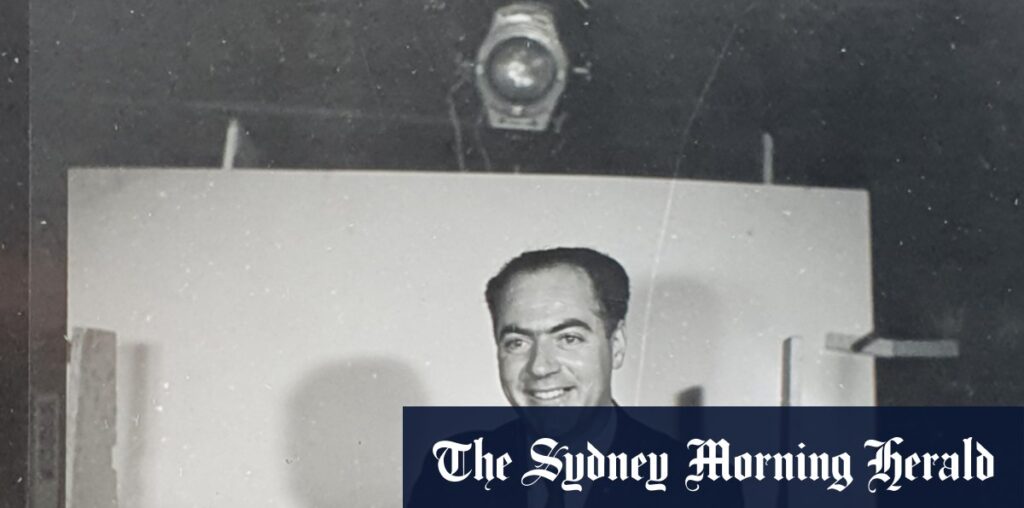In letters between them many years later, Beckett fondly remembered the influence of their old and eccentric headmaster George McKenna, who introduced them to botanical drawing in the bush, art, poetry and, embarrassingly for sturdy bush boys, folk dancing. Most significantly however, “Mac” McKenna introduced them to the world of film.
Beckett later recalled that McKenna “took us to other countries and the wider world through the screening of films on his silent Bell and Howell projector, borrowing films from film libraries – probably at his own expense”.
McKenna’s films must have some effect. A few years later, aged 15, Beckett left school to work first in photography and then in the film industry.
His first industry job was with the Melbourne-based Shell Film Unit which produced and screened documentaries around Australia. In his four years with the unit, Beckett directed and edited films including On Stream (1954), City of Geelong (1957) and Two Men of Fiji (1958).
Keen about cinema in all its forms, he joined the Melbourne Film Society, attended Australia’s first film festivals in Olinda and Melbourne and was a founder of the Melbourne Repertory Film Unit. When the advent of Australian television spelt the end of the Shell Film Unit, Beckett moved to Sydney, where he became an independent producer and then a staff director making sponsored documentaries and commercials at Supreme Films and Cinesound Productions.
From 1970 he produced at the Commonwealth Film Unit (renamed Film Australia in 1973), where his films Tempo – Australia in the Seventies (1971), Unknown Land (1972) and Gentle Strangers (1972) won prizes.
In 1974, Beckett stepped back from active production for the rest of his career, and his work with government in Canberra played a crucial role in the development of the film industry. His 19 years with a succession of federal arts and heritage bodies began with the Whitlam government’s Department of the Media.
He next became a film policy officer with the Department of Prime Minister and Cabinet’s Arts and Media Branch, and his brief included scrutiny of film related appointments and financial estimates before they were sent to the arts minister. In the late 1970s and 1980s, he recommended proposals that involved the Australia Council’s film responsibilities being transferred to the Australian Film Commission and the Australian Film and Television School adopting radio to become the Australian, Film, Television and Radio School.
During these years, Walton, as AFTRS director, was in constant contact with Beckett in Canberra on matters relating to budget and policy. He remembers Beckett as a fine writer who gave bureaucratic correspondence some finesse and flourish. He hated bad argument and when faced with sloppy submissions from departments, his scorn could blister paint.

Roland Beckett
Other government initiatives in which Beckett had a say were the advent of Artbank, tax incentives for film production, Public Lending Rights and the Taxation Incentives for the Arts Scheme. When he was acting director of the National Collections section of the Department of Arts, Heritage and Environment (1984-1987), he had among his responsibilities the National Film and Sound Archive, National Library of Australia, National Museum of Australia and early work on the establishment of the Australian National Maritime Museum.
After Beckett retired at the age of 60, he poured his energy into voluntary work including heritage consultancy for the Australian National Maritime Museum and membership of the Bundanon Trust and the Film and Broadcast Industries Oral History Group.
A polymath with wide interests, Beckett is remembered by some who knew him as an aloof and shy person with few close friends and by others as a popular and generous individual who was a team player.
Beckett never married but had a long-term partnership with retired schoolteacher Beverley Ogle. They had a shared interest in Australian history and at the time of his death Beckett was writing a paper about Henry Lawson’s short story, The Australian Cinematograph (1897).

